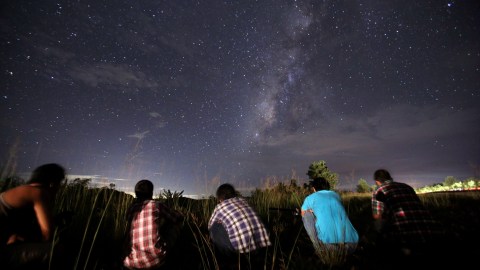Obama Just Signed a Law That Contradicts International Agreements about Space

Space has always been thought to operate under maritime law, but the US Space Act of 2015 puts all that in dispute.
Over Thanksgiving, when many Americans were overindulging, President Barack Obama signed a new space bill into law. Its purpose is to encourage business expansion into space through the mining of resources. But in doing so, the bill also gives companies the right to ownership in space, which is contrary to the international agreement that space belongs to no one.
The bill reads:
“Any asteroid resources obtained in outer space are the property of the entity that obtained them, which shall be entitled to all property rights to them, consistent with applicable federal law and existing international obligations.”
This bill spits in the face of two internationally settled agreements on the laws of space (in the legal sense): The Outer Space Treaty of 1967 and the Moon Agreement of 1979. The United States had signed the former, but not the latter. The Moon Agreement forbids states to conduct commercial mining operations until there is an international body that can oversee such operations. But Gbenga Oduntan, a senior lecturer in international commercial law at the University of Kent argues, “While the US has refused to sign up to this, it is binding as customary international law.”
Instead, the United States seems satisfied with ignoring agreements and transforming outer space into the wild west, re-creating the California Gold Rush in deep space.
Space mining may seem like a far-fetched notion out of sci-fi novels, but industry leaders predict they could be mining asteroids by 2025. Yes, asteroid mining companies do exist, says award-winning journalist Steven Kotler. “And we also have really serious economic reasons for pursuing this. A lot of the metals, rare earth metals that we need to make all of our electronic gear are very scarce on Earth and totally plentiful in space.”
There’s a lot of commercial potential, but also a lot of worry among scientists about what such operations could do to harm discovery. If there’s no oversight, celestial bodies could become contaminated, muddling clues to Earth’s existence or the discovery of alien life.
There’s a lot at stake here, and the United States thinks it has the right to give it away.
***
Natalie has been writing professionally for about 6 years. After graduating from Ithaca College with a degree in Feature Writing, she snagged a job at PCMag.com where she had the opportunity to review all the latest consumer gadgets. Since then she has become a writer for hire, freelancing for various websites. In her spare time, you may find her riding her motorcycle, reading YA novels, hiking, or playing video games. Follow her on Twitter: @nat_schumaker
Photo Credit: AFP / Stringer/ Getty





